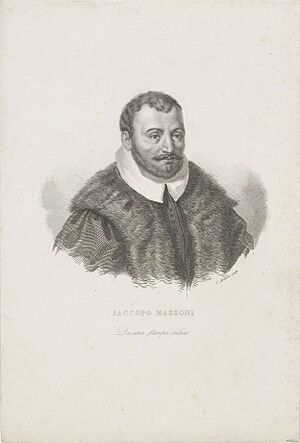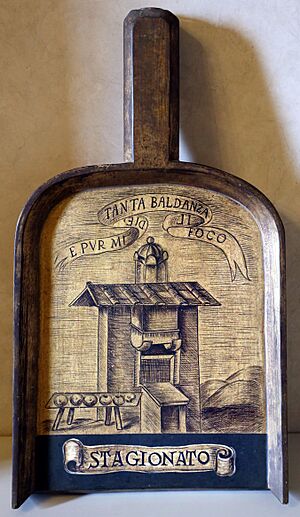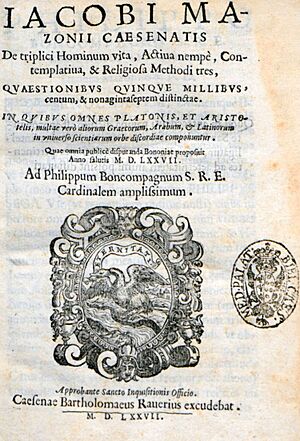Jacopo Mazzoni facts for kids
Quick facts for kids
Jacopo Mazzoni
|
|
|---|---|

Jacopo Mazzoni
|
|
| Born | 27 November 1548 Cesena, Papal States
|
| Died | 10 April 1598 (aged 49) Ferrara, Papal States
|
| Nationality | Italian |
| Education | University of Padua |
| Era | Renaissance |
| School |
|
| Institutions | Accademia della Crusca |
Jacopo Mazzoni (also known as Jacobus Mazzonius) was an Italian philosopher who lived from 1548 to 1598. He taught at the University of Pisa and was a friend of the famous scientist Galileo Galilei. Sometimes, his first name is spelled "Giacomo."
Contents
About Jacopo Mazzoni
Jacopo Mazzoni was born in Cesena, which was part of the Papal States (now Italy), on November 27, 1548. He studied many subjects in Bologna, including Hebrew, Greek, Latin, rhetoric (the art of speaking or writing effectively), and poetics (the theory of poetry). In 1563, he went to the University of Padua to study philosophy and jurisprudence (the theory of law).
Mazzoni was known as a very smart person during his time. He had an amazing memory, which helped him remember parts of works by famous writers like Dante, Lucretius, and Virgil. He often used these in his debates with important public figures. His great memory also made him excellent at memory contests, which he usually won. It is said that he even beat the famous Admirable Crichton three times in dialectic (a way of finding truth through logical discussion).
Later in his life, Mazzoni taught at universities in Rome, Paris, and Cesena. He also helped to create the Della Crusca Academy, which is important for the Italian language. He was an expert in ancient languages and philology (the study of language in historical texts). He greatly helped the scientific study of the Italian language. Jacopo Mazzoni passed away in Ferrara, Italy, in 1598.
Jacopo Mazzoni's Main Works
Even though Mazzoni saw himself mostly as a philosopher, his main philosophical work is not widely read today. This book, called De Triplici Hominum Vita (which means On the Three Ways of Man’s Life), tried to bring together the ideas of Plato and Aristotle. It was published in 1576.
Mazzoni is best known for his work on literary criticism, especially his defenses of Dante’s famous poem, the Divine Comedy. His first defense, Discorso in Difesa Della Commedia Della Divino Poeta Dante (The Discourse in Defense of the Comedy of the Divine Poet Dante), came out in 1572. He wrote a second, more detailed defense called Della Difesa Della Comedia Di Dante (On the Defense of the Comedy of Dante), which was published much later, in 1688.
Mazzoni wrote his first defense of Dante because a noble friend was upset about people criticizing the Divine Comedy. Mazzoni said he wrote this first book in just 20 days. Some people criticized it for not always being clear or for just disagreeing with Dante's critics instead of proving them wrong.
To answer these criticisms, Mazzoni wrote his second, more detailed book. In this work, he first explained his own ideas about poetry. He talked about mimesis (imitation), what poetry is for, and how poetry is different from the study of poetry.
Mazzoni's Ideas on Poetry
One of Mazzoni’s most interesting ideas is about how poetry imitates things. He believed that poetry doesn't just copy real objects. Instead, it creates an "ideal" version of something. He called this ideal version an "idol." This "idol" is like a perfect model created by human art. Poetic imitations are then compared to this "idol" to see how believable they are.
Mazzoni focused on how believable or credible something is, rather than whether it is truly real. He thought poetry was a way of creating something that seems real, even if it isn't. The goal of poetry, for him, was to have the right effect on the audience. He said that if a poet had to choose between something false but believable, and something true but unbelievable, the poet should choose the believable one.
Mazzoni also connected poetry to rhetoric (the art of persuasion). Both, he believed, aim for what is believable, not necessarily what is true. He thought that how well a poem affects its audience is very important. Even though poetry tries to imitate things accurately, its success is finally judged by how well it persuades people, not by how true or objective it is. For Mazzoni, good poetry happens when the audience connects with it.
Like Plato, Mazzoni cared a lot about the purpose of poetry. He believed its purpose was to "move the reader to pleasure and delight." So, for Mazzoni, poetry is mainly for fun and enjoyment. However, he also added the idea of "civil faculty." This means that taking a break with poetry can help people return to serious work with fresh energy. He also thought that poetry, besides being delightful, could secretly teach lessons or morals that help improve society.
Mazzoni's work often tried to make clear differences between things that seemed similar. For example, he explained the difference between "poetry" and "poetics." "Poetry" is about how a poem is made (like rhyme or rhythm). "Poetics" is about how a poem relates to its "civil faculty" (how it helps society).
He also used ideas from Plato to explain "icastic" and "phantastic" imitation.
- Icastic imitation is when something is copied from reality. For example, creating a character based on a real person.
- Phantastic imitation is when something is copied entirely from the artist's imagination.
This difference was important in Mazzoni's defense of Dante. He argued that Dante's Divine Comedy, which is an allegory based on a divine vision, was icastic imitation. This is because it imitated something "real" (the divine vision). This idea helped him argue against critics who said Dante's work wasn't realistic or even wasn't true poetry. Mazzoni believed that poetry was about making things "persuasive" through art and skill.
Who Influenced Mazzoni?
Some of Mazzoni's influences are clear, like the ancient Greek philosophers Plato and Aristotle. Mazzoni often mentioned their works and took some of his ideas directly from them. For example, the difference between icastic and phantastic imitation comes from Plato. Other thinkers also influenced Mazzoni, including later followers of Plato like Proclus, and Greek writers like Dionysius of Halicarnassus and Aulus Gellius. These last two especially influenced Mazzoni's ideas about how the poet's character affects the poem.
Works by Jacopo Mazzoni
 | Janet Taylor Pickett |
 | Synthia Saint James |
 | Howardena Pindell |
 | Faith Ringgold |



